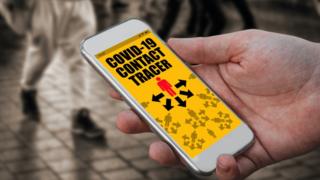


Image copyright
Getty Images
There are growing stress over the very best technique to coronavirus contact-tracing apps and whether or not the technology can measure up to its guarantee.
Mobile phone software is being established to alert users when someone they were recently near ends up being contaminated.
But the Ada Lovelace Institute has actually said there is “an absence of evidence” such tools are useful, precise or technically capable.
Others stress the initiative should be backed up by an army of human checkers.
To further make complex matters, a schism has actually emerged among technologists collaborating to establish a pan-Europe solution.
And numerous scientists and researchers have signed a declaration alerting “objective creep” might eventually result in “unmatched surveillance of society at large”.
If any user is later on thought to have become infected and records the reality, a cascade of informs might quickly be sent to others.
They utilize a variety of methods, including keeping logs of users’ International Positioning System (GPS) area information and asking them to scan Quick Reaction (QR) codes.
And many countries are now focused on using another innovation – wireless Bluetooth signals – to detect contact matches.
Image copyright
Getty Images
Bluetooth-based systems are gaining ground over those that rely on GPS.
” Digital contact tracing will be less able to manage for variables such as ventilation, direction of wind or environment, elements that are normally main to manual contact-tracing efforts,” it states.
However given that the app won’t be 100%trustworthy or used by everyone, experts say manual contact tracing still has a role to play.
” If you ask me whether any Bluetooth contact-tracing system deployed or under advancement anywhere in the world is all set to change manual contact tracing, I will state without credentials that the response is no, not now and, even with the benefit of [artificial intelligence], not for the foreseeable future,” blogged Jason Bay, who led advancement of Singapore’s TraceTogether app.
Image copyright
Getty Images
The chief of Singapore’s TraceTogether app says human checkers are still needed.
And last week, England’s Health Minister, Matt Hancock, stated he was dedicated to constructing up the nation’s ranks.
But in many cases, where apps have yet to launch, they have yet to explain how they would do so.
” I would say the information actually matter, and we have no information,” stated Prof Vanessa Teague, from the University of Melbourne, about Australia’s upcoming app.
NHSX – the health service division establishing the UK’s app – remains in conversations with Apple and Google about embracing their plan however has yet to dedicate.
” Users’ personal privacy is essential, which is why we are dealing with other countries, a range of experts, stakeholders and industry to guarantee the app under advancement is led by the best scientific and scientific recommendations to lower transmission of the infection whilst safeguarding user personal privacy,” a spokesperson stated.
Why are privacy advocates divided?
Prior To Apple and Google ended up being involved, there was a separate effort to produce the technical foundations of a contact-tracing system that let would various countries’ apps collaborate rather than becoming incompatible at each country’s borders.
However in previous days a rift has developed in the Pan-European Privacy Preserving Proximity Tracing (PEPP-PT) task.
Numerous of the participants have actually quit, pointing out a variety of privacy issues.
” Effectively, practically every one of the prestigious organizations that made it pan-European have actually now left,” Dr Michael Veale, of the Decentralized Privacy-Preserving Distance Tracing (DP3T) group, told BBC News.
“[There was] a lack of any proper governance and openness in a time where deep openness is needed.”
Vodafone, among others, have actually stood by the PEPP-PT task however the group’s organisers admit they might have managed the circumstance better.
” We have publicly apologised for the way that interaction around the 2 approaches that are under conversation has been handled,” a spokesperson informed BBC News, adding it remained in conversations with more than 40 nations to adopt its solution.
What about those without compatible phones?
Not everyone with a mobile phone will be able to utilize the apps released.
Globally, about 25%of the active 3.4 billion smartphones are incapable of the Bluetooth Low Energy (LE) standard needed by Google and Apple, according to a report by Counterpoint Research study.
The UK figure is 12%- but lots of other individuals have more basic cellphones without any access to the iOS or Android app stores.
” The majority of these users struggle with digital divide,” analyst Neil Shah said.
” Either they are too old to use a smartphone, would find it intricate, or count on a hand-me-down model.
” Or they come from a lower-income group and are not able to pay for a better-spec handset.”
” I worry that it’s the individuals who do not have [compatible] phones and are entirely in the blind spot of this and [the] individuals who do not have the luxury of stressing about getting ill because they merely require the money from their high-risk jobs that mean these apps will not get extensively embraced,” stated data scientist Cathy O’Neil.
No-one thinks apps are the entire solution.
But their protectors state they are a beneficial weapon in an “armoury of epidemic control steps” and if enough individuals adopt them, a 2nd wave of cases could be reduced, saving numerous lives as an effect.

